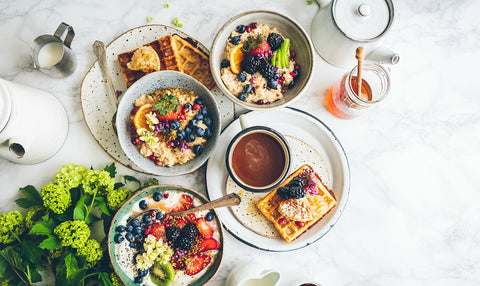Wild, local probiotics you can collect and propagate yourself!
Dear child has many names, this applies to the highest degree to flowers and herbs. The same plant can have tens of names and differ between different landscapes.
To prevent confusion, the Latin names are in italics after the Swedish ones. Good to google if you are unsure.
HARVEST SUSTAINABLE
Do not pick too much in one place. Do not pull up roots. In cultivated forest, of course, you may not take shoots or twigs without permission from the landowner. Do not pick near spills, dumps, drains, industry, train tracks, busy roads or artificially fertilized land.
Here are just a few suggestions for herbs and berries for your herbal probiotic. Maturity times vary depending on where in the country you are.
APRIL MAY JUNE:
Buckwheat seed Noccaea or Thlaspi caerulescens. NOTE, make sure to pick on land that is not contaminated by emissions such as cadmium (near artificially fertilized land or industry) as Backskärvfrö easily accumulates metals.
Birch leaf Betula , all varieties
Spruce shoots Picea abies
Cherry bowl Aegopodium podagraria
Lomme Capsella bursa-pastoris
Onion trot Alliaria petiolata
Dandelion leaves and flowers Taraxacum officinale
Nettle Urtica dioica
Galium aparine
Pinus sylvestris (pine shoot + seed meal) Pinus sylvestris
White plaster Lamium album
Wetland Stellaria media
JUNE JULY:
Elderflower Sambucus nigra
Plantain Plantago major
Golden rice Solidago virgaurea
Goose herb Anseris herba
St. John's wort Hypericum perforatum
Petals of rose Rosa canina, Rosa rugosa, Rosa dumalis
Red clover Trifolium pratense
Forest violet Viola riviniana Meadow violet Viola arvensis, Stepmother's violet Viola tricolor
Elk grass flower and leaves FIlipendula ulmaria
JULY AUGUST SEPTEMBER:
Blueberry Vaccinium myrtillus
Elderberry Sambucus nigra
Golden rice Solidago virgaurea
Hawthorn berry Crataegus laevigata, Crataegus oxyancantha
Medlar (wild variety), called Saskatoon berry (the cultivated variety) Amelanchier alnifolia
Lingonberry Vaccinium vitis-idaea
Rosehip Rosa canina, Rosa rugosa, Rosa dumalis
Chamaenerion (formerly Epilobium) angustifolium
Wild raspberry Rubus idaeus
DO THIS:
1. Mix berries, leaves, flowers as desired in a large glass jar or pitcher. Do not rinse them. Experiment! A handful of herbs/berries to about ½ - 1 liter of water. Take more if you want stronger flavor.
2. Put the plant material in water, stir if necessary. put some honey in the water (from your local beekeeper and unsprayed forests/meadows).
3. Leave in a dark and warm place with a lid loosely on and put a paper bag or put a towel over it.
4. Wait a few days and it will start to bubble and become slightly sour. Make sure all the herb material is below the surface of the water, push it down with a clean fork. If it starts to mold or smell anything other than sourly fresh, throw it away.
5. Acidify until you think it's just right, strain and store cold.
6. Alternatively, you can strain and drink before it starts to ferment. Let it sit for a few hours or over a day and then drink.
7. Enjoy!
Plants and berries contain potassium and other minerals, bitter substances and bioflavonoids that act as antioxidants and anti-inflammatory in the body. On wild unsprayed plants there is a flora of benign fungi & bacteria. When they are dissolved in water together with the nutrients in the plant/berry, it grows and ferments easily.
The drink is rich in enzymes which, among other things, help digestion and the immune system. This natural probiotic is perfectly adapted to those who live exactly where these berries, flowers and leaves grow and ripen.
In addition, the cheapest you can find and you avoid additives found in many food supplements.
Your homemade probiotics in the form of flower, leaf or berry drink provides a guaranteed unique experience, everything from when you go out and observe the plant location and the time when the plants mature and flower and seed until you get to enjoy it at home in your kitchen the enzymatic transformation and feel the flavors and effect in your body and mind. Good luck!




